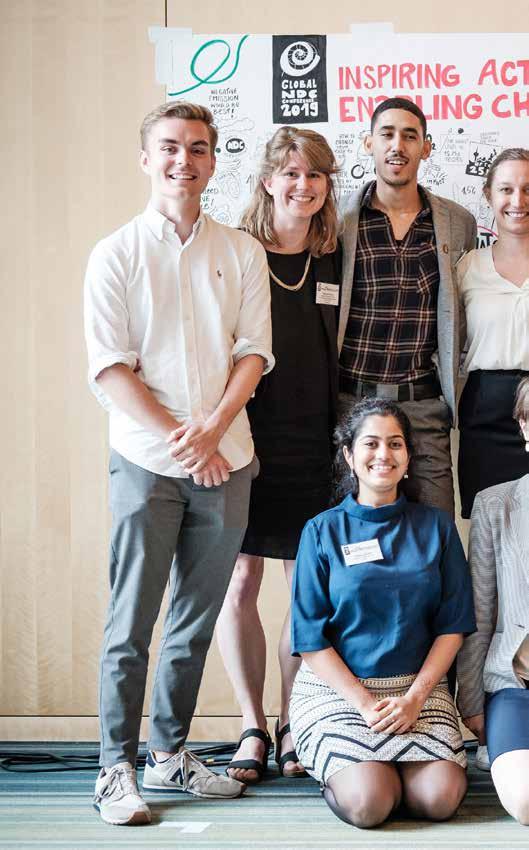
4 minute read
STRENGTHEN CLIMATE CHANGE CAPACITY BUILDING FOR YOUNG PEOPLE
through the Knowledge Portal. Members may also use school, university, or other networks to disseminate this information.
Including youth-led projects in Partnership Plans and mobilizing support for them.
Advertisement
Considering formal structures at the local level to support youth participation in climate projects. Member institutions with expertise around local youth engagement can support providing technical guidance to governments on effective youth engagement and ensuring youth are key stakeholders in urban and rural programs.
In COVID-19 green recovery planning and stimulus packages, supporting sustainable youth entrepreneurship and youthled projects that contribute to NDC implementation and economic development and employment creation at the same time.
3
Capacity development is essential for empowering youth to take action on climate change. Members are encouraged to consider capacity building for young people as a critical component of their climate work.
3.1
TOOLBOX

The NDC Partnership Knowledge Portal includes useful resources, tools, good practices, and funding opportunities to help scale NDC action through sharing of knowledge. A new tag related to youth will be integrated in the system so that young people, members, and the general public can more easily find resources related to youth engagement and the NDCs and resources targeting youth audiences.
In collaboration with youth groups, the Support Unit will identify and include existing resources on climate change to support formal, informal, and non-formal education curricula (where available) that can serve as examples for integration at the country level. Members are encouraged to use these educational resources at the national and local level as part of capacity building efforts for youth.
The Support Unit regularly requests content from members for the Knowledge Portal. These requests will include educational curricula focusing on climate change, case studies that reflect success stories, and lessons learned from youth engagement around NDCs and youth-led or youth-supported NDC implementation projects. Resources meeting the guidelines for the Knowledge Portal will be incorporated by the Support Unit.
3.2
EDUCATION
There are low-cost, easy-access opportunities to build capacity on climate change and NDCs among youth at the national and local level.
Members are encouraged to provide and support youth-led
trainings and learning resources at the national and/or
local level to help youth understand and engage in climate action in country and share their perspectives. These efforts should include ensuring the formal integration of climate, environmental, and disaster risk reduction practices into the national curriculum. Trainings based on young people’s own experiences and projects that provide role models are effective and cost-efficient10. Members can also develop small communications pieces that youth can access via web downloading, for access in areas with no connectivity.

The Support Unit will collaborate with members to develop an educational video on what the NDCs are and showcase best practices emerging from the Partnership for whole-of-society engagement (including youth) in NDC implementation projects.
Member countries are encouraged to host regular virtual in-
country workshops in collaboration with other members
to strengthen the skills and networks of youth climate leaders and empower them to share their experiences, lessons, and challenges in their local communities, while educating their peers about climate action happening in the country. On request from countries, Partnership members

may facilitate virtual regional events and/or these requests can be considered in designing the Partnership’s annual Youth Engagement Forum (see Section 4.3).
Members may consider creating a global, national, or regional scholarship fund for young climate leaders to strengthen their studies in areas that support the implementation of NDCs, both in academic and technical training (such as paid internships).
These scholarships can include public-private partnerships to finance more opportunities for young climate leaders.
If scholarships are already in place, members are encouraged to share details through the NDC Partnership for wider dissemination and more inclusive participation. A list of relevant scholarship resources will be made available and kept up to date on the NDC Partnership Knowledge Portal.
3.3
REGULAR ANALYSIS AND KNOWLEDGE SHARING
The Support Unit will gather best practices and updates on youth engagement in NDC action at least every other year, where possible, in collaboration with youth groups or experts. An initial overview has been developed based on inputs from members through the YEP consultations (see Youth Engagement Resources Document).
The Support Unit will develop regular analyses, briefings, and other knowledge products for, about, and with young people.
The Support Unit welcomes collaboration with youth groups, networks, and members on these. This includes periodic analysis (at least once per year) focusing on youth-related requests by countries and highlighting new tools available on youth engagement in climate action.
The Support Unit will collaborate with members to create communication products (e.g., blogs, newsletter items) that provide insight into youth-related requests by countries, highlight best practices and lessons emerging from the Partnership, and provide suggestions for youth (especially via social media) on how they can best contribute to the Partnership’s work. Members and the Support Unit can showcase 1-3 youth organisations or initiatives per year to highlight their work related to NDCs, including, for example, by providing a space on the NDC Partnership Pavilion at COPs.
The Partnership will welcome collaboration with global or regional youth organizations and the Support Unit will use its communication platforms to ensure that opportunities to engage through the YEP are well publicized.






